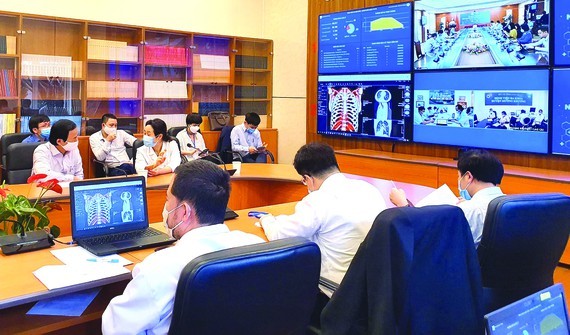
Right at the first outbreak of Covid-19 in Vietnam at the beginning of last year, the Health Ministry predicted certain travelling trouble between regions, and thus cooperating with the Information & Communications Ministry, Viettel Military Industry and Telecoms Group and other functional units to find ways to implement IT in disease diagnosis and treatment, leading to the birth of Telehealth.
In June 2020, Hanoi Medical University Hospital was the first to install Telehealth. Then came the participation of other major hospitals in Hanoi, Ho Chi Minh City, Hue City, Da Nang City. Until now, the system has over 1,500 members nationwide.
Not only does Telehealth connect central-leveled hospitals with provincial ones, and provincial hospitals with district ones, it is able to provide links with medical institutes in remote areas, border islands like Co To Island, Con Dao Island, Bach Long Vi Island, Muong Nhe Commune.
Thanks to the approval of the Government and the direction of the Health Ministry, the Information & Communications Ministry, Viettel and VNPT were able to finish the installation of the Telehealth system for 328 district-leveled medical units in 47 provinces and cities in two days.
As a result, doctors from Cho Ray Hospital could provide timely diagnosis and treatment for severe Covid-19 cases in Can Gio Covid-19 Hospital (sited in HCMC), Hau Nghia General Hospital (in Long An Province), and Thuan An Hospital (in Binh Duong Province).
Obviously, Telehealth is able to reduce the overloading state of high-leveled hospitals and decrease direct contact between patients and doctors. Simultaneously, it lets doctors of district level gain more professional knowledge and confidence in diagnosis and treatment of extremely sick people. Patients of all diseases, especially Covid-19, can receive prompt and effective treatment in the golden hour, leading to more chances for recovery.
Director of Bach Mai Hospital Nguyen Quang Tuan informed that right after the establishment of the Covid-19 Intensive Care Center in Field Hospital No.16, his hospital set up a camera system to monitor patients 24/7.
This system is linked with monitoring centers and Telehealth in order to ease the workload of healthcare officers and to receive the best medical consultation from senior doctors, while also playing the role of a training channel for junior colleagues in HCMC and the Southern provinces”, said Tuan.
Health Minister Nguyen Thanh Long has recently requested that all health departments of provinces and cities direct Covid-19 hospitals under their management to create Telehealth connections among departments and wards, as well as to other hospitals.
At the same time, National and Regional Intensive Care Centers must provide suitable hardware and form a consultation and distance treatment network for hospitals accepting and treating Covid-19 patients under their responsibility via the most convenient IT platforms (Viettel network, VNPT network, Zoom, Zalo, Viber, etc.) so that timely medical instructions can be delivered.
Minister Long informed that in the near future, medical institutes nationwide will use electronic medical records to serve the vaccination campaign and to issue a Covid-19 vaccine passport for citizens. These e-medical records will also be used for online medical examination and treatment registration in the future.
























